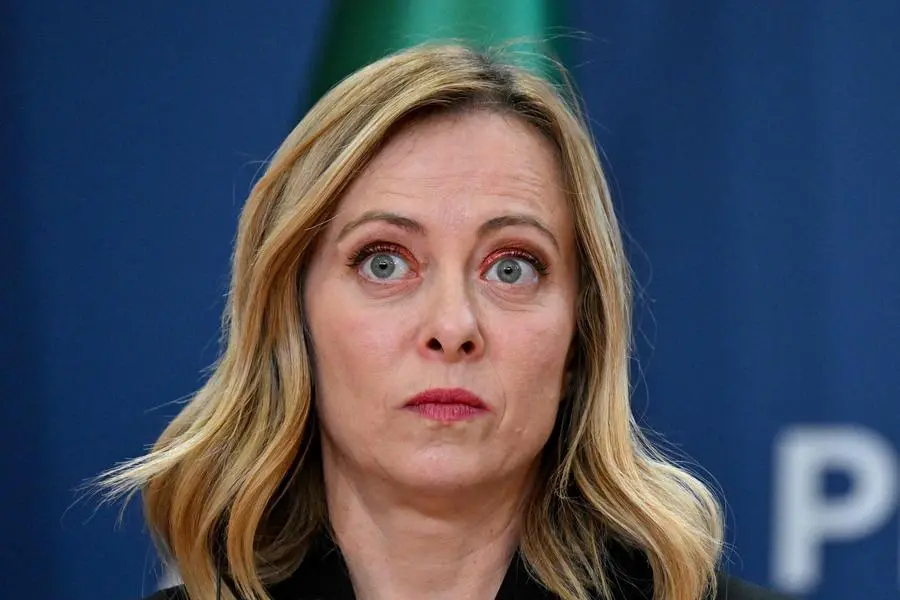PHOTO
Energy deals in return for stopping migration. Italy's hard-right Giorgia Meloni reveals her long-trailed development plan for Africa this weekend, a "non-predatory" approach which critics warn favours European priorities and pockets.
Prime Minister Meloni, who came to power in 2022 on an anti-migrant ticket, hopes to posit Italy as a key bridge between Africa and Europe, funnelling energy north while exchanging investment in the south for deals aimed at preventing migration.
Heads of numerous African countries are expected in the Italian capital for a summit on Sunday and Monday, along with European Commission President Ursula von der Leyen and representatives of United Nations agencies and the World Bank.
Meloni's so-called Mattei Plan is named after Enrico Mattei, the founder of Eni -- Italy's state-owned energy giant.
In the 1950s, he advocated a co-operative stance towards African countries, helping them to develop their natural resources.
"A certain paternalistic and predatory approach has not worked so far. What needs to be done in Africa is not charity but strategic partnerships, as equals," Meloni, 47, said earlier this month.
Rome holds the presidency of the G7 group of nations this year and has vowed to make African development a central theme, in part to increase influence in a continent where powers such as China, Russia, India, Japan and Turkey have been expanding their political clout.
Experts warned Italy may struggle to get key support for a new deal from the European Union, which unveiled its own Africa package worth 150 billion euros ($160 billion) in 2022.
Meloni's government, which cut funds for foreign aid cooperation last year, has formally allocated a more modest 2.8 million euros a year from 2024 to 2026 for the Mattei Plan, details of which are scant.
But Italy's best-selling Corriere della Sera daily said the government could earmark four billion euros for the plan in the next five to seven years.
Schemes are expected to include efforts to develop African agribusiness and mobilise Italian transport and major works companies.
But the biggest investment is expected in energy.
- Natural resources -
Meloni wants to transform Italy into an energy gateway, capitalising on demand from fellow European countries seeking to slash their dependence on Russian gas following Moscow's February 2022 invasion of Ukraine.
Critics say the plan appears too heavily focused on fossil fuels.
Some Italian media have dubbed it the "Descalzi Plan", after Eni chief executive Claudio Descalzi.
Some 40 African civil society organisations warned this week that the plan's "principal objective is to expand Italy's access to Africa's fossil gas for Europe and strengthen Italian companies' role in exploiting Africa's natural and human resources".
Dean Bhekumuzi Bhebhe, head of the Don't Gas Africa campaign, said Rome's "blind ambition... disregards the urgent climate crisis and the voices of African civil society".
They called instead for a renewable energy drive to supply the needs of over 40 percent of Africans who have no access to energy at all.
Francesco Sassi, researcher in energy geopolitics at the RIE think tank, told AFP Meloni was pursuing a "short-sighted" and "oversimplified strategy to deal with energy insecurity and the challenges of the energy transition".
Her "apolitical" approach also "implies fewer intrusions into the domestic policy of African energy partners, whether this be in human rights defence or energy and environmental policies".
- Remote -
While energy "may be the most relevant part" of the Mattei Plan, "Meloni is investing political capital in it mostly because of migration", according to Giovanni Carbone, head of the Africa Programme at the Institute for International Political Studies (ISPI) in Milan.
Despite promising to stop migrant boats from North Africa, landings in Italy have risen under Meloni, from some 105,000 in 2022 to almost 158,000 in 2023.
Italy has been training the Libyan and Tunisian coastguards as part of an EU initiative.
The Mattei Plan also intends to tackle so-called push factors and persuade origin countries to sign readmittance deals for migrants refused permission to stay in Italy.
Experts warn the initiative must be structured to last, in a country famed for its chronic political instability.
Carbone questioned whether the government has the necessary African development knowledge or experience to make the plan work.
"Italy has a tradition of relatively close relations with Mediterranean countries such as Tunisia, Libya, partly Algeria and Egypt as well, but less so with sub-Saharan Africa, which should be at the heart of the Mattei Plan," he told AFP.
"Italy has primarily small and medium-sized enterprises, for which it would be a big step to think about investing in what are perceived to be very remote and often problematic countries."
Former Italian prime minister Matteo Renzi also looked towards sub-Saharan African markets in 2014 to 2016, "but it proved very difficult", Carbone added.





















